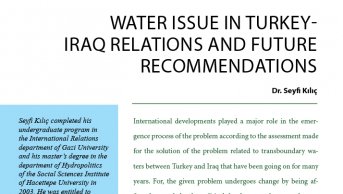Reasons for Water Problems

Until the end of the 19th century, the utilization of rivers was restricted to transportation, fishing and small-scale irrigation and apart from navigation, did not create much problems between states.
In addition to the lack of intensive agricultural irrigation or industrial use, the political structure of that period is the biggest factor why rivers did not create problems. The empires that disintegrated as a result of independence movements that started after World War I and reached their climax following World War II left behind many states. In the basins that were managed under a single administration earlier, many national states subsequently emerged, causing problems between these new countries over the utilization of transboundary or border setting rivers.
Another development that coincided with this process was the improvement and spread of water storage techniques. Upstream countries -- countries that benefited due to their geographical position at the head of rivers -- had the opportunity to utilize a river first. Depending on agricultural and industrial utilization, decreasing the amount of water or changing its properties caused upstream-downstream conflicts. Apart from these conflicts, a problem can also arise between a state that starts utilizing the waters much earlier and a state that starts utilizing them later.
At a time when the gap between water supply and demand is shrinking, disagreements over transboundary, or border setting, waters generally emerge when implementing a project that could affect another basin country or countries beside the predominant country of a basin. New agricultural policies are the main factor causing riparian countries to use high volumes of water. Moreover, disagreements within water systems are more likely to arise when there is a natural fluctuation in water flows.
Apart from water problems, other existing tensions between riparian countries cause the countries to attach increasing importance to security in general and to food security in particular. The concept of food security, by causing the concept of “water security” to emerge, has caused tensions to further increase between countries.
Just as political changes in basin countries can positively contribute to settlements of conflicts, they can also have a negative effect. Although in the 1950s, when Sudan gained its independence and a pro-Egypt coup took place in the country, negotiations between Egypt and Sudan had not developed much. But both sides eased their approaches following the coup and a treaty was signed on Nov. 8, 1959. However, again in the Nile basin, tension between Egypt and a new government in Ethiopia that came to power as a result of a Marxist coup increased.
Parties sometimes adopt a stance that is far from flexible but which is later accepted by the public, forcing decision makers to bow to the public’s wishes. This situation also makes it difficult to reach a negotiation. In the disagreement concerning the Ganges River, India and Bangladesh acted in this manner and entered a deadlock.
Another factor causing water disagreements is the political divisions that caused riparian countries to emerge. As experienced in the basins of the Ganges, the Indus and the Nile, with the dominant power being eliminated and new states emerging, disagreements arise in the basins that fall under the dominance of more than one country. Existing border problems in riparian countries can cause conflicts to become more complex.
Among the factors that also affect water disagreements, the number of parties to the conflict is also significant. Reconciling the interests of riparian countries of the River Nile, whose numbers have increased to 11, is more difficult than the disagreements over the Rio Grande and the Sarda (Mahakali) rivers, with only two riparian countries each.
The importance that a nation attaches to water resources could be listed among the factors that determine the intensity of disagreements. In terms of its national history, the waters of a river being considered the life resource of the nation will also cause that state to adopt a stance that is more irreconcilable and harsh in water disagreements. Furthermore, the importance attached to water and food security on a political basis determines countries’ approaches to transboundary and boundary forming waters. The size of agriculture within the national economy increases the importance that countries give to waters and can also cause them to adopt more irreconcilable approaches in disagreements.
Among the obstacles facing negotiations conducted by basin countries for a resolution to conflicts is parties’ desire to actually settle the conflict through cooperation. The existence of other problems between riparian countries is also another important obstacle to the settlement of conflicts. Riparian countries are able to address water conflicts in negotiations on their own. Although it could be thought that reconciliation can be reached more easily this way, it can also create negative consequences in some situations. Addressing water problems on their own carries the risk of preventing mutual concessions that could be beneficial to both sides and could also prevent the actual settlement of the conflict over water resources.
In conclusion, it can be seen that just as with other problems between countries, disagreements concerning transboundary or border setting rivers between riparian countries are settled in a manner proportional to their powers. International law, in terms of its structure, lacks sanction power. In addition, the novelty and insufficiency of the law concerning transboundary or border setting waters causes each riparian to easily find an allegation that shows their water utilization as just and the opposite side’s utilization as unjust in the subsidiary sources of international law. This situation makes it impossible to link the settlement of transboundary water conflicts to certain rules, and such conflicts can only be resolved on political platforms.










